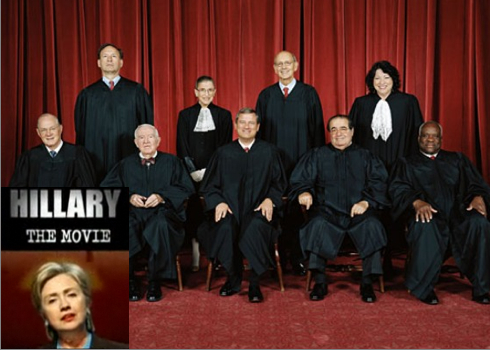Since the Supreme Court struck down limits last week on corporate-funded independent expenditure campaigns, Democrats and good-government advocates have been quick to warn of a flood of new corporate money entering American politics. But with campaigns already awash in corporate cash, some Democratic political pros doubt we’ll notice much difference.
In a typical response, Fred Wertheimer, the dean of Washington’s campaign-finance reform community, called the ruling “a disaster for the American people and a dark day for the Supreme Court,” predicting that the decision will unleash massive new corporate spending into the electoral arena. And even President Obama warned in Wednesday’s State of the Union speech that the decision could open the door to foreign corporations influencing our elections — a concern we’ve raised ourselves.
But in interviews with TPMmuckraker, some of the people who do the day-to-day work of electoral campaign strategy question whether the decision will have as transformative an effect as reform advocates fear. They say, essentially, that while no one yet knows just how things will play out, there’s already so much corporate money in the system that changes will likely only be felt on the margins. And they note that the predictions of campaign-finance advocates have been wrong before.
“I don’t think this is going to fundamentally change the way campaigns are done,” said Mike Lux, a prominent Democratic consultant and operative who founded the Progressive Donor Network.
Steve Murphy, a Democratic consultant and former top aide to Dick Gephardt, agreed. “I don’t believe this is a dramatic shift,” he said.
Both men noted that corporations already move billions into entities that allow them to run hard-hitting “issue” ads. It’s true that those ads couldn’t directly advocate for the election or a defeat of a candidate. But they said that in their experience, issue ads are more effective anyway. In other words, corporations have long had a potent enough weapon at their disposal to influence elections when they’ve wanted to.
“I actually prefer a message where you say: ‘here’s an issue that’s important, here’s how your senator is voting, tell them they’re wrong,'” said Lux.
Murphy echoed that take. “We found in testing so-called issue ads against candidate ads the voters felt the issue ads had more credibility,” he said. “They preferred receiving the information without the didactic call to vote for a particular candidate.”
Murphy also scoffed at predictions that the ruling will badly disadvantage Democrats, who generally get less support from corporations than does the GOP. “We heard the same dire warnings about the demise of Democrats’ prospects after McCain-Feingold,” he said, noting that in fact, Democrats had retaken Congress not long after.
“I don’t think this is gonna change things all that much,” Murphy concluded.
Murphy allowed that the ruling could have an unusually large effect this year, because Republicans face a favorable political climate but lack money. “In an atypical year, where the GOP stands to make significant gains and they’re under-financed, it could have the effect of expanding the playing field,” he said. “But in a more typical year where you don’t have that many competitive races to begin with, it won’t matter that much.”
A third Democratic consultant, Tom King, pointed out that independent expenditure campaigns run by corporations could create unintended headaches for the candidates on whose behalf they were being run. “It takes out of your hands what the messaging is,” said King. “They can be a real detriment.”
King, too, expressed some skepticism that the ruling will have as far-reaching an effect as predicted. “Sometimes we over-blow these kind of things,” he said. “They can have an impact but how much, I’m not quite sure.”
True, the ruling also struck down the ban on corporate funds being used for any ad — even an issue ad — that mentions a candidate 30 to 60 days of an election. But Murphy argued that the campaigns themselves already just about saturate the airwaves in the final weeks of a race. “Have you watched TV within 30 days of an election?” he asked. “It’s already pretty crowded.”
It’s not just consultants who take this view. Stephen Weissman, a campaign-finance reform expert who worked until recently at George Washington University’s Campaign Finance Institute, argued Thursday in a Los Angeles Times op-ed that because existing restrictions are already so lax, the ruling will likely have little practical effect. “Perhaps corporate and union-financed ‘express advocacy’ will increase somewhat, particularly in grass-roots communications aimed at already committed followers,” he wrote. “But the overall size, nature and thrust of corporate and union communications in federal elections is unlikely to be affected by Citizens United.”
To be sure, this isn’t the consensus view, even in the consultant community. Mark Mellman, a veteran Democratic pollster, predicted that we could see niche corporations with very specific issues before Congress spend through the nose to try to defeat a candidate who has taken them on. “I don’t think that the Ford Motor Company is gonna take out ads trying to defeat some member of Congress,” he said. “However, there may be smaller corporations that have much more particularized interests that could do that.”
Whatever the reality, Democrats have begun using the court’s decision, and GOP support for it, as a tool to paint the Republicans as allies of corporations, and to tout Democrats’ populist credentials. “Instead of protesting the decision and vowing to work with Democrats to enact legislation to curb runaway corporate spending on elections, establishment Republicans hailed the decision,” noted the DSCC last week.
But some in the consultant community see the issue as less than a political winner, arguing that voters don’t care about process issues, and will judge Democrats by their substantive achievements.
“I wish Democrats would talk about this a little less,” said Murphy. “We’ve got to produce.”






